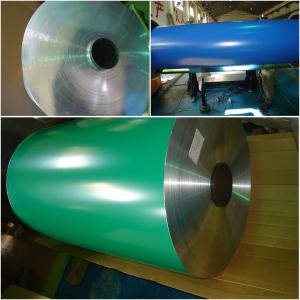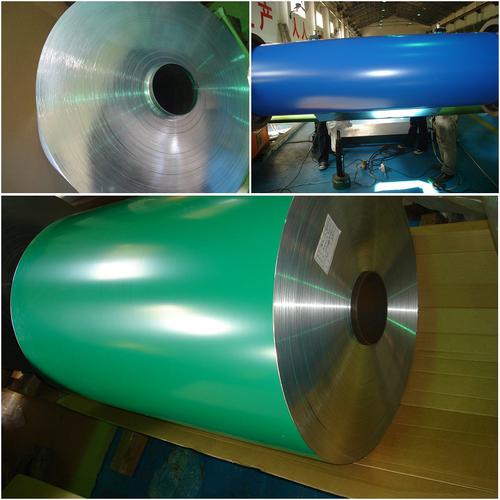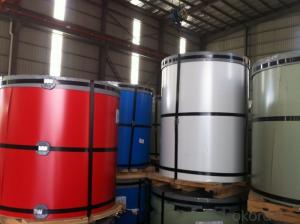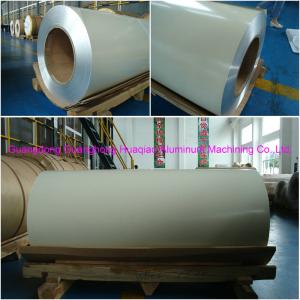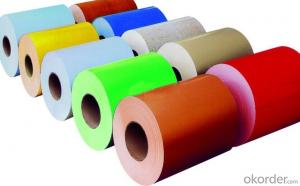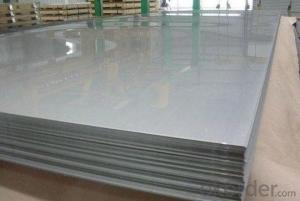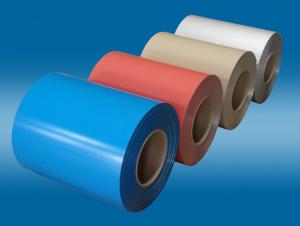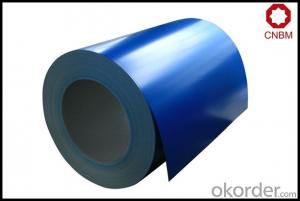Collapsible Aluminum Coiler PE Paint Prepainted Aluminum Sheet Coil
- Loading Port:
- China Main Port
- Payment Terms:
- TT OR LC
- Min Order Qty:
- -
- Supply Capability:
- -
OKorder Service Pledge
OKorder Financial Service
You Might Also Like
PE Aluminum Coating Coils for ACP
Features of PE Aluminum Sheet:
1. Adopting precision rolling coatingtechnology, our PVDF and PE coated coil can ensure excellent adhesive withoutcoating omission.
2. For the PE coated aluminum coil weproduced, there are various colors for your choice.
3. Using infrared heating technology toprotect environment from pollution.
4. Our coated aluminum coil has four-rollercoating line, uniform coating thickness and good features.
RawMaterial of the PE Aluminum Coating Coils:
1. Aluminum Coil: high strength aluminum withalloy of AA1100 (aluminum alloy is available with AA3003, AA3005, AA5005according to customer)
2. Surface Paint: PE, PVDF and specialpaints.
Specification of PE Aluminum Coating Coil
Width: 20mm~1590mm
Thickness: 0.06mm~1.0mm
External Diameter: ≤ 1500mm
Internal Diameter: 405mm, 505mm, 150mm, 75mm
Coil weight: ≤ 4000kg
PE coated aluminum coil is processed throughthe technics of roller coating and baking with precise polyester paints. Itscolor is glossy and with variety of colors enabling you to choose easily.Chromatic aberration is small, impact resistance is strong and easy to beprocessed, and all its performance has reached or surpassed the nationalcriteria. The products are widely used in indoor and door decoration, ceilings,room surface tiles, corrugated boards, wall panels, advertisement boards, counters,home appliances, decoration in and out of autos and boats.
Performance of the coating
Aluminum Thickness | Coating Thickness | MEK | T- Bend | Impact | Adhesion | Pencil Hardness | Boiling Water Proof |
0.3-1.5mm | ≥18μm | ≥100 Times | ≤2T | 50 kg•cm | 0 Grade | ≥HB | no change within 2 hours |
0.2-0.28mm | ≥18μm | ≥100 Times | ≤2T | 30kg•cm | 0 Grade | ≥HB | no change within 2 hours |
0.15-0.18mm | ≥18μm | ≥100 Times | ≤3T | 20 kg•cm | 0 Grade | ≥HB | no change within 2 hours |
0.08-0.12mm | ≥16μm | ≥80 Times | ≤4T | 10 kg•cm | ≤1 Grade | ≥HB | no change within 1 hour |
0.022-0.06mm | ≥12μm | ≥50 Times | - | - | ≤1Grade | ≥HB | no change within1 hour |
Color of Card
PE (polyester)
PE
Color Match
For custom' color requests, we can deal as following:
1. Supply a physical sample of custom color. A color sample on metal ispreferred. If other, it is also acceptable. But the color matching rate may benot good as color on metal.
2. New color sample is usually offered by our paint supplier in 5-7 days,special color should be in 7-10 days.
3. Upon receipt of color sample, please approve in writing as soon as possible.Once you approved, we will arrange purchasing and production.
Note: Color difference maybe occurred in different production batch, so it issuggested all panels are placed in one order for same project. And keep samedirection as arrow on protective film when installing to avoid any colordifference by vision
- Q: How do aluminum coils contribute to energy-efficient appliance manufacturing?
- Aluminum coils contribute to energy-efficient appliance manufacturing by offering several key advantages. Firstly, aluminum is a lightweight material that reduces the overall weight of appliances, making them easier to transport and reducing energy consumption during transportation. Secondly, aluminum has excellent heat transfer properties, allowing for more efficient heat exchange in appliances like refrigerators, air conditioners, and heat pumps. This leads to improved energy efficiency and reduced electricity consumption. Additionally, aluminum coils are highly durable and resistant to corrosion, ensuring longer appliance lifespans and minimizing the need for replacements. Overall, the use of aluminum coils in appliance manufacturing plays a significant role in enhancing energy efficiency and reducing environmental impact.
- Q: What are the common installation methods for aluminum coils?
- Aluminum coils can be installed using various methods, each with its own advantages and applications. 1. Direct Attachment: To install aluminum coils, one can directly attach them to the desired surface, like a wall or roof. The specific method of attachment, whether it's screws, nails, or adhesive, depends on the application and surface condition. This method is commonly used for exterior applications such as siding and roofing. 2. Coil Stock Installation: Another method involves cutting the aluminum coil into smaller pieces known as coil stock, which are then installed individually. This method is ideal for projects that require a customized fit, such as wrapping window frames or creating trim pieces. Precise measurement and cutting are crucial for a perfect fit. 3. Coil Over Existing Material: In certain cases, aluminum coils can be installed directly over existing materials like old siding or roofing. This cost-effective method allows for updating the appearance of a building without the need for complete removal and replacement. It also saves time and labor compared to other methods. 4. Coil Cladding: Coil cladding is a popular installation method where the aluminum coil is wrapped around an existing structure, such as a column or beam. This provides both protection and aesthetic appeal to the structure. In architectural applications, coil cladding is often used to enhance the appearance of buildings and add a layer of protection to structural elements. It's important to consider the specific requirements of the application, surface condition, and desired outcome when choosing an installation method for aluminum coils. Consulting a professional or following manufacturer guidelines is recommended to ensure proper installation, maximize longevity, and maintain optimal performance of the aluminum coils.
- Q: How are aluminum coils protected against oxidation during storage?
- Aluminum coils are protected against oxidation during storage by applying a thin layer of protective coating or by storing them in a controlled environment, such as a dry and moisture-free area. This prevents exposure to oxygen and moisture, which are the main factors contributing to oxidation.
- Q: what is aircraft grade aluminum?
- Aircraft grade Aluminum is made to be very durable and strong, also Aluminum does not rust.
- Q: I don't know, I see a metal is a metal. I understand that a bike shop bike has better service and the bike has better components. Yet I just feel the frame of a $500 bike store bike and a $100 bike from Walmart using aluminum is the same. It's like people charging $100 for audio/video cables when a $1 no-name cable works the same for tv. Is this the same marketing ploy in the bike industry?I see a Mongoose bike for $500 to $1000 on their website, yet I see one with the same frame metal at Walmart/Kmart for only $100. Mongoose is a reputable name. What gives?What do you think? Is the metal quality in a $500 aluminum bike shop bike the same as a $100 aluminum department store bike?
- This Site Might Help You. RE: Is a $500 Aluminum mountain bike store bike the same as a $100 aluminum mountain bike from Walmart? I don't know, I see a metal is a metal. I understand that a bike shop bike has better service and the bike has better components. Yet I just feel the frame of a $500 bike store bike and a $100 bike from Walmart using aluminum is the same. It's like people charging $100 for audio/video...
- Q: Are aluminum coils suitable for electrical conductors?
- Yes, aluminum coils are suitable for electrical conductors. Aluminum is a widely used material in the electrical industry due to its excellent electrical conductivity. It has around 61% conductivity of copper, which is the most commonly used metal for electrical conductors. Aluminum coils are lightweight, cost-effective, and have good thermal conductivity, making them a popular choice for various electrical applications. However, it is important to note that aluminum has a lower tensile strength compared to copper, so it may require a larger cross-sectional area to achieve the same level of current carrying capacity. Additionally, proper insulation and connectors are necessary to prevent oxidation and ensure efficient electrical conductivity in aluminum coils.
- Q: Is it safe and effective to use an electric stove to heat an aluminum coil?
- <p>Yes, you can use an electric stove to heat an aluminum coil. Aluminum is a good conductor of heat, so it will heat up when placed on an electric stove. However, it's important to ensure the coil is clean and free of any non-stick coatings that could be damaged by high heat. Also, be cautious of the temperature settings on your stove, as aluminum can melt at high temperatures. Always monitor the coil to prevent overheating or fire hazards.</p>
- Q: How are aluminum coils tested for strength and durability?
- Aluminum coils are tested for strength and durability through various methods such as tension testing, hardness testing, and corrosion resistance testing. Tension testing involves subjecting the coils to gradually increasing force to determine their breaking point and tensile strength. Hardness testing measures the coil's resistance to indentation or scratching, providing insight into its durability. Additionally, corrosion resistance testing assesses the coil's ability to withstand environmental factors that may cause deterioration. These comprehensive tests ensure the quality and reliability of aluminum coils in various applications.
- Q: Are aluminum coils suitable for coil winding applications?
- Coil winding applications can utilize aluminum coils, as they possess numerous advantageous properties. Firstly, aluminum is lightweight, facilitating easier handling and transportation. Industries like automotive and aerospace, which prioritize weight reduction, find this particularly beneficial. Moreover, aluminum exhibits excellent conductivity, ensuring efficient electrical current flow within the coil. This is especially advantageous for applications requiring high performance and low resistance, such as transformers and electric motors. Additionally, aluminum's high resistance to corrosion renders it suitable for outdoor and harsh environments. Unlike metals like steel, it does not rust and can endure exposure to moisture and chemicals. Furthermore, aluminum coils offer cost-effectiveness. Compared to metals like copper, commonly used in coil winding, aluminum is generally more affordable. Thus, it presents a cost-efficient option for various industries. Nevertheless, it is important to acknowledge that aluminum has lower electrical conductivity than copper. Therefore, in applications where high conductivity is paramount, such as power transmission, copper coils may be more suitable. Nonetheless, aluminum coils provide numerous benefits and find widespread use in various coil winding applications.
- Q: Can aluminum coils be used in the manufacturing of window frames?
- Yes, aluminum coils can be used in the manufacturing of window frames. Aluminum is a lightweight, durable, and corrosion-resistant material, making it a popular choice for window frames. Coils allow for efficient production and customization of window frame shapes and sizes.
Send your message to us
Collapsible Aluminum Coiler PE Paint Prepainted Aluminum Sheet Coil
- Loading Port:
- China Main Port
- Payment Terms:
- TT OR LC
- Min Order Qty:
- -
- Supply Capability:
- -
OKorder Service Pledge
OKorder Financial Service
Similar products
Hot products
Hot Searches
Related keywords
